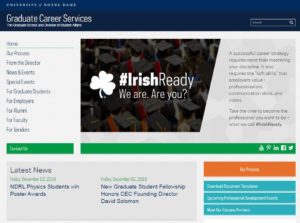
With commencement taking place this weekend, I can’t help but think of the transition that will take place for grad students who have completed their programs. Particularly for those students receiving terminal degrees, there likely will not be further formal education in your future, and a new set of habits and behaviors will be necessary for success beyond the Golden Dome.
TheMuse recently published a list of 43 simple habits that can improve your life, even if you only did a few of them. Since that list is geared toward life in general, I thought I would spin some of the non-work ones as they could relate to improving your work life more specifically. Reference the original list for context as you explore these opportunities to grow as a professional and colleague.
1. Do the Gratitude Snooze
If you are incorporating this habit in your daily life, I suggest including the following on your list of things to be grateful for: your new degree, your time at Notre Dame, your advisor’s time and support, other mentors who helped you here, your next opportunity (even if you don’t know what it is yet), your future colleagues, the opportunity to learn and grow in new or different ways, etc.
4. Meditate
Whether you are still applying for jobs or preparing to start your new career, meditation can provide focus, clarity, and renewed mental energy for tackling any aspect of career development. Feeling stuck customizing a cover letter? Hit a wall in arranging informational interviews? Need motivation to read the training manual for your new position? Give meditation a try.
7. Eat Mindfully
When starting a new career, it can be tempting to work through lunch in order to accomplish everything that needs to get done. However, take some time to step away from your desk, if possible, and eat mindfully. You can avoid indigestion and overeating, and might connect better with your new colleagues.
8. Breathe Deeply
Breathing exercises are helpful no matter what is stressing you out, but the job search and transitioning to a new career involve many stressors that can benefit from three seconds in, hold for one, and exhale for five.
17. Put Yourself in “Monk Mode”
I have started to do this myself where I close my e-mail tab for a period of time while focusing on a project. Engaging in deep concentration on a task can lead to more productivity for me.
19. Stand Up
As you may have seen, I sprained my neck back in April. My chiropractor compared the negative health effects of sitting at my desk all day to those of smoking (figuratively), and encouraged me to take breaks from sitting every 30 minutes.
20. Strike a [Power] Pose
I have long advocated for the benefits of power poses on interview success. Before entering an interview (not during the interview), hold postures that are expansive, such as arms out wide or on your hips while puffing your chest out. This can reduce interview anxiety and increase interview success. Try it to calm your nerves before giving a job talk or a big presentation at your new job.
23. Practice Being Charismatic
When starting a new job (or interviewing for one), it is important to connect with your colleagues or hiring committee. People connect more easily with individuals they enjoy speaking to and being around.
24. Listen
Get to know the environment and your co-workers before asserting your own ideas. It will give you credibility, and the information you learn while listening will help you pitch your ideas more effectively.
31. Put Your Phone Away
This should go without saying, but don’t bring your phone to group and one-on-one meetings. Even if others are using their phones, maintain your level of professionalism at all times.
33. Set Up Your Own “Smile Therapy”
For those moments when you feel overwhelmed by the search or at your new job, forcing yourself to smile can tangibly affect your mood and boost your confidence.
38. Help Someone
This is important at work, but also offers to reframe the networking process. When attending a networking event, don’t look for people who can help you achieve your goals. Instead, try to identify opportunities to help others achieve their goals. In return, they will gratefully try to help you achieve yours.
40. Create a “Jar of Awesome”
Whenever someone sends me an e-mail complimenting my work or expressing their sincere appreciation for my efforts, I save it in my “kudos” folder. I know a colleague who keeps a “smile file.” Reviewing these e-mails and notes comes in handy when I need a boost of confidence or morale.
43. Practice Self-Compassion
Slogging through the job search is hard, as is transitioning to a new role and identity. Give yourself a break, and don’t feel guilty about not reaching every goal. Do the best you can, and know that we are here to help along the way.
Do you have other habits that have helped you become #IrishReady for success? Add them in the comments, tweet them to us @ndgradcareers, or post them on our Facebook page.
















